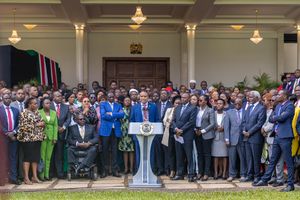
President William Ruto during the Kenya Kwanza Parliament Parliamentary Group Meeting at State House, Nairobi on June 18, 2024.
The government now targets to increase petroleum and export promotion taxes to fill the void left after dropping some levies contained in the Finance Bill, 2024.
And the authorities are determined to exempt the Kenya Revenue Authority (KRA) from the provisions of the Data Protection Act that will allow the taxman to snoop on individuals’ private information, specifically financial dealings without a court order.
The Finance Bill had projected to raise about Sh302 billion in additional revenue to finance the Sh3.9 trillion budget.
The National Treasury has projected that KRA will collect Sh2.95 billion in ordinary and Appropriations in Aid (AiA) to finance the budget with no intention of borrowing.
Part of the additional revenue projections were to be realised through the removal of bread from the zero-rated commodities into the tax bracket, imposition of 25 percent excise duty on crude edible and refined oils as well as motor vehicle tax at the rate of 2.5 percent on the value of the car.
The others include introduction of Eco Levy at the rate of Sh150 per kilogramme of plastic packaging material that would have seen the prices of commodities that use plastic packaging increase.
The Bill also proposed the introduction of VAT on the financial transactions.
The imposition of the motor vehicle tax alone would have earned the government Sh58 billion a year from the over 3.5 million registered cars in the country.
However, a report on the Bill tabled in Parliament by the National Assembly Finance and National Planning Committee chaired by Molo MP Kimani Kuria has proposed changes to the Bill for alternative sources of revenue.
“The changes we are proposing in this Bill will make it not just a revenue raising Bill but a matter that addresses policy issues to increase productivity and create jobs,” said Mr Kimani.
The MP also affirmed the proposal to allow KRA access to personal data.
The proposal to amend Section 51 of the Data Protection Act, which outlines the circumstances under which exemptions might apply is the route the committee is proposing to take.
Section 60 of the Tax Procedures Act empowers the commissioner or an authorised officer with a warrant to have full access to any data for the purposes of administering a tax law.
The Road Maintenance Levy is charged on all petroleum fuels imported to Kenya for home use and the current levy amounts to Sh18 per litre of all petroleum fuels, with an anti-adulteration levy of the same amount charged on kerosene.
The levy is deposited into the Road Maintenance Levy Fund for annual repair and maintenance of roads under the administration by the Kenya Roads Board.
“To help raise sufficient funds to maintain and repair roads across the country the committee recommends an increase of the levy pursuant to Section 3 of the Road Maintenance Levy Fund Act,” the committee recommends in its report.
In the 2022/23 financial year, KRA collected Sh84.14 billion but the performance of the levy in 2023/24 has been negatively affected by the demand effects of the high fuel prices and the exchange rate depreciation.
“The fall in the collections under the road maintenance levy has continued to affect the repair and maintenance of highways, urban, and rural roads,” said Mr Kuria.
The recent El-Nino linked heavy rains and flooding has further worsened the extent of road destruction in the country.
The levy has not been varied since 2017 despite the increase in petroleum fuel prices per litre in Kenya over the years and the increased cost of road repair and maintenance.
The committee further recommends that the expected increase in local Appropriations-In-Aid (AIA) to the State Department for Roads may be accompanied by a reduction in net exchequer allocation to the State Department.
On the Export Investment Promotion Levy, the committee observes that there is a consistent trend of a decline in exports from the country and a significant rise in imports even for goods manufactured locally.
The committee notes that the objective of the Export Investment Promotion Levy is to protect the local manufacturing sector from unfair trade practices, increase the competitiveness of Kenya’s manufacturing sector and to foster a sustainable and inclusive export sector.
“The committee proposes to impose the Export and Investment Promotion Levy on articles of leather, imported footwear, denatured ethyl alcohol, ceramic sinks, and wash basins, amongst other products,” recommends the committee in the report.
EIPL is envisaged to have impact in the manufacturing sector, which includes support for local manufacturing, which will increase the contribution of manufacturing to GDP from 7 percent to 20 percent by 2027.
It is also set to enhance the playing field for local manufacturers who have struggled to compete with cheaper imports.






